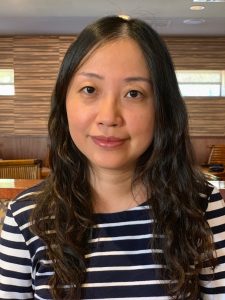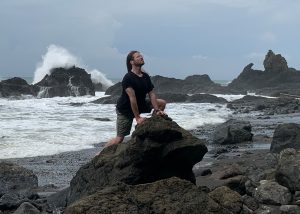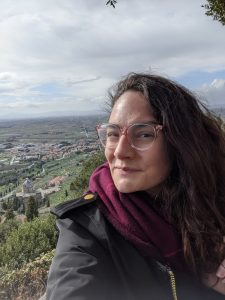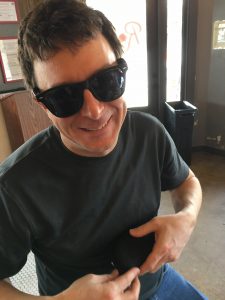Featured Faculty
Faculty in the Department of Communication are engaged in internationalization in a number of ways. Faculty have conducted research in, among other locales, Brazil, China, Israel, Mexico, Sweden, and the United Kingdom. They have been invited to deliver keynote addresses and conduct workshops in countries in Asia, Europe, and Latin America. They have also led education abroad trips to China, Costa Rica, Ireland, Italy, and Mexico. Our international faculty bring experience and expertise that enrich our department and our students’ educational experience. Below are some highlights.
 Lu Tang
Lu Tang
Having grown up in China and moved to the United States 20 years ago, my research and teaching are inherently international.
I work closely with graduate students on research projects about health communication in different countries. Recognizing that people’s understanding of health and their health behaviors are deeply rooted in the specific cultures of different countries and regions, we have completed or are currently engaging in several research projects:
- How Chinese people acquired and processed information during the COVID-19 pandemic and how they define rumors.
- Misinformation about vaccines in Arabic language on YouTube.
- How do Middle Eastern immigrants navigate the healthcare system in the US?
- Mental illness stigma in China.
I am the Financial Committee Chair and Research Co-Chair of the Chinese Communication Association, a scholarly organization of several hundred faculty members and students who are interested in studying communication in the context of greater China. I have been the program planner for CCA’s research panels at the National Communication Association annual conference for the last few years. I have given lectures at Chinese universities, such as Beijing University and Zhejiang University.
 David Tarvin
David Tarvin
Dr. Tarvin believes studying abroad is the single most important and transformative experience students should try to accomplish in their undergraduate education. Dr. Tarvin has studied abroad in Mexico, China, Costa Rica, and Italy. Dr. Tarvin led students abroad to Castiglion Fiorentino, Italy in spring 2019. In 2020, Dr. Tarvin will lead students abroad on two different excursions: Costa Rica for Spring Break and South Africa for a May-mester course. When asked why education abroad is so important, Dr. Tarvin responded: “You do not know who you are, until you know who you are not. I learn so much about the world and about myself each time I take students abroad. Thanks to my time in Costa Rica, I now have a Pura Vida (‘good life’) attitude that influences all aspects of my life.”
 Sandra Braman
Sandra Braman
The focus of my research agenda, information policy — an umbrella term for all laws and regulations that pertain to any form of information creation, processing, flows and use or, more colloquially, law and policy for information, communication, and culture — is inherently international and/or global, a distinction that matters because the former involves issues bounded by national governments and spaces, while the latter does not; Internet governance, for example, is global, not international. Current activities include:
- Participating in a transnational research network, organized by the Federal University of Pará (Brazil), on information policy and the deforestation of the Amazon, a collaboration that grew out of conversations during the October 2018 Brazilian national information science association conference in Londrina for which I provided the opening keynote
- Collaborating with Canadian scholars on issues raised by artificial intelligence and governance; the first public-facing event from this work will be a video and publications out of an invitation-only workshop held in Montreal — currently the leading city in the world in the area of artificial intelligence — in December, 2019
- Completing 3 additional journal articles in the series based on research the US National Science Foundation funded on policy issues that arise in the course of technical decision-making for the Internet, adding to the 8 items already published from this work
- Sitting on the advisory boards of three large, well-funded international research projects:
- “Human Mind in the Changing World” (University of Helsinki, Finland)
- “DatActive: The Politics of Data According to Civil Society” (University of Amsterdam, The Netherlands)
- “Platform Governance: Rethinking Internet Regulation as Internet Policy” (Queensland University of Technology, Australia, a project led by Terry Flew, current President of the International Communication Association)
- Proactively working to publish authors from around the world on international and global information policy topics as Editor of the Information Policy Book Series at MIT Press; recent examples include Zoning China: Online Video, Popular Culture, and the State, by Luzhou Li; Human Rights in the Age of Platforms, edited by Rikke Frank Jørgensen; and Reluctant Power: Networks, Corporations, and the Struggle for Global Governance in the Early 20th Century, by Rita Zajácz

Sara Rowe
As one of the faculty members teaching the COMM to Italy 2020 program, I was teaching in the same little Italian town where I had studied as a student in 2008. Every corner and experience brought up so many memories. In my story, that study abroad experience was a major shifting point in my life. It’s where I figured out what career path I wanted, where I learned to be more independent, and where I fell in love with travel.
In 2020, returning to Italy with a group of Aggie undergrads, I was so excited to be a part of their experience. From Day 1, I saw our COMM students build a new way of living and a sense of family in this new space. When we would walk into a new church or visit another charming town, their reactions of awe and glee reminded me why this history and architecture are so special. I loved chatting on the train with students on the way back from a field trip and to hear their observations of the day. My own revelation from the 2020 trip was that while the study abroad experience seems to be profound and irreplaceable for many, the way they understand and tell that story would be different for each individual. Although our trip was cut short and had some extra stress due to the timing, I don’t regret and I don’t think any of my students do, the opportunity to have the time that we did in Italy.

Patrick Burkhart
Burkart led 100+ students to Study Abroad in Mexico City over seven years. He taught Intercultural Communications and Global Media – Mexico, sponsored independent research projects on Mexican media industries, and coordinated student internships with international media firms and agencies in Mexico City.
Burkart has taught Global Media, Intercultural Communication, and Master’s Thesis research courses at Karlstad University in Karlstad, Sweden as Visiting Docent (Associate Professor). He worked with Swedish students and professors as he completed research for a book on the Swedish Pirate Party.
Professor Burkart was a Visiting Professor at Luleå Technological University in Luleå, Sweden while investigating Spotify as a Swedish cultural institution with a Swedish research group. Students in the project participated in user interviews, conference management, and editorial work with the project’s 16 scholarly publications.
Burkart has also researched and worked on communication technology and policy projects at Tampere University and Helsinki University, Finland, and taught graduate courses on media economics and intercultural communication at Copenhagen Business School, Denmark.
Professor Burkart was Editor in Chief of Popular Communication: The International Journal of Media and Culture from 2012-2022 and is a coordinator from A&M for the Global Fusion research consortium and annual conference (with University of Texas, Southern Illinois University, Ohio University, Temple University, and University of Virginia).
